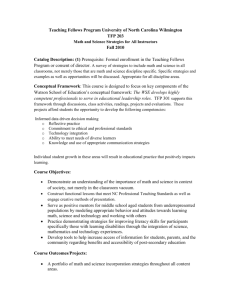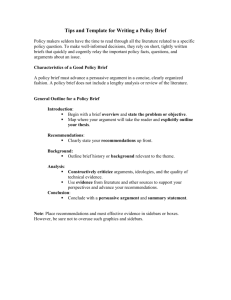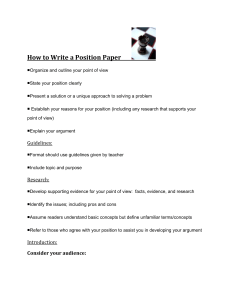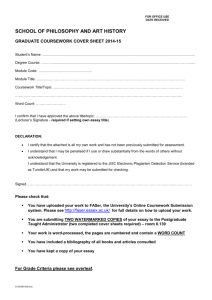101 syllabus - People Server at UNCW
advertisement
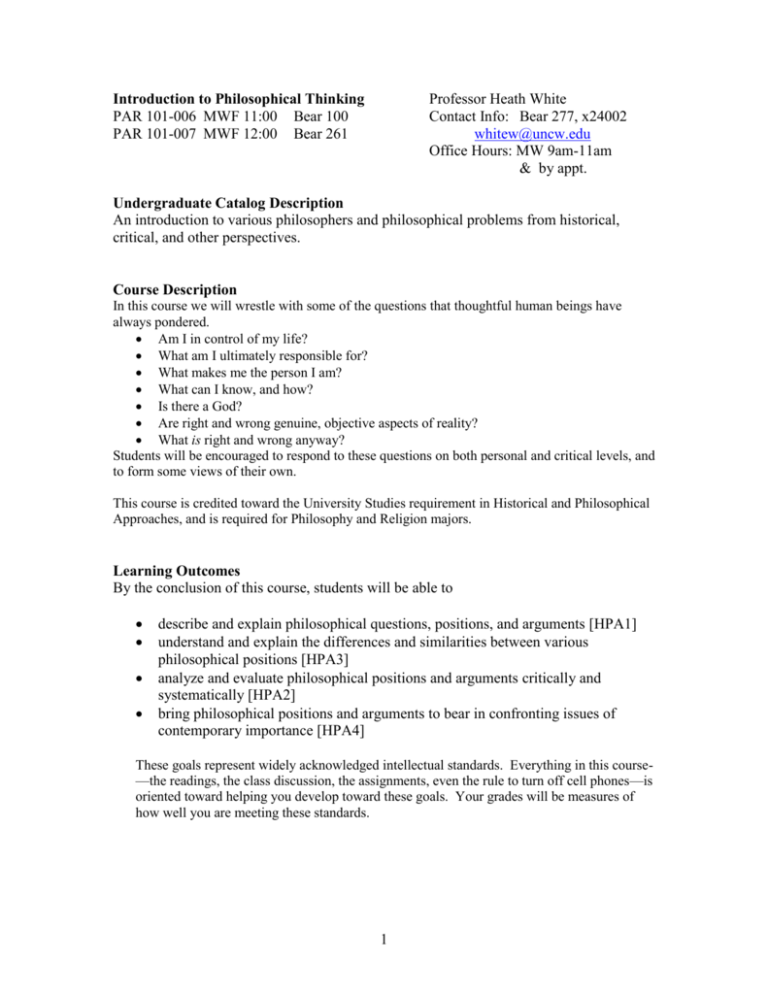
Introduction to Philosophical Thinking PAR 101-006 MWF 11:00 Bear 100 PAR 101-007 MWF 12:00 Bear 261 Professor Heath White Contact Info: Bear 277, x24002 whitew@uncw.edu Office Hours: MW 9am-11am & by appt. Undergraduate Catalog Description An introduction to various philosophers and philosophical problems from historical, critical, and other perspectives. Course Description In this course we will wrestle with some of the questions that thoughtful human beings have always pondered. Am I in control of my life? What am I ultimately responsible for? What makes me the person I am? What can I know, and how? Is there a God? Are right and wrong genuine, objective aspects of reality? What is right and wrong anyway? Students will be encouraged to respond to these questions on both personal and critical levels, and to form some views of their own. This course is credited toward the University Studies requirement in Historical and Philosophical Approaches, and is required for Philosophy and Religion majors. Learning Outcomes By the conclusion of this course, students will be able to describe and explain philosophical questions, positions, and arguments [HPA1] understand and explain the differences and similarities between various philosophical positions [HPA3] analyze and evaluate philosophical positions and arguments critically and systematically [HPA2] bring philosophical positions and arguments to bear in confronting issues of contemporary importance [HPA4] These goals represent widely acknowledged intellectual standards. Everything in this course—the readings, the class discussion, the assignments, even the rule to turn off cell phones—is oriented toward helping you develop toward these goals. Your grades will be measures of how well you are meeting these standards. 1 Grades and Assignments The assignments in the course are designed both to assist and to measure your progress toward the goals of the course. They consist of three ‘argument’ papers of increasing length and weight, three in-class ‘peer review’ sessions for the argument papers, and contribution to class discussion. Note that later paper assignments count for more than earlier ones; the goal is to give you chances to improve over the course of the semester. Your grade will be calculated as follows: First argument paper (3 pp.) + peer review Second argument paper (3 pp.) + peer review Third argument paper (4 pp.) + peer review Class contribution 17% + 3% 27% + 3% 37% + 3% 10% Late Papers I will accept papers up to a week late, with a penalty of 1/3 of a grade (A to A-, A- to B+, etc.) for every class day they are late. It will be your responsibility to make sure I receive any late papers. Text You have one required text, Introduction to Philosophy: Classical and Contemporary Readings, 4th edition, ed. Louis P. Pojman and James Fieser. The Honor Code and Academic Honesty UNCW adheres to an Academic Honor Code which contains this summary paragraph, the Honor Statement: "The University of North Carolina Wilmington is a community of high academic standards where academic integrity is valued. UNCW students are committed to honesty and truthfulness in academic inquiry and in the pursuit of knowledge. This commitment begins when new students matriculate at UNCW, continues as they create work of the highest quality while part of the university community, and endures as a core value throughout their lives." Every student at the university has also signed the Honor Pledge: “As a student at The University of North Carolina Wilmington, I am committed to honesty and truthfulness in academic inquiry and in the pursuit of knowledge. I pledge to uphold and promote the UNCW Student Academic Honor Code.” This class is committed to the ideals expressed in the Honor Statement and the Honor Pledge. You are responsible for knowing what counts as academic dishonesty (primarily, cheating and plagiarism) in the Academic Honor Code, and you are encouraged to familiarize yourself with it. If you do not understand these guidelines, or are not sure how to apply them, see me or the Writing Center or the University Learning Center. 2 Attendance Policy Absences with a reasonable document reason may be excused at the discretion of the professor. More than three unexcused absences will result in 2 points per absence being taken off your final grade. Special Requirements If you have a handicap, learning disability, or other condition which requires special consideration, contact the Office of Disability Services (962-7555). Please give me a copy of the letter you receive from Office of Disability Services detailing class accommodations you may need as soon as possible. Cell Phones and Other Class Disruptions Turn off your cell phones and stow them when you enter class. Do not check your cell phone, or send text messages, during class. Do not listen to an iPod, MP3 player, or similar device while in class. You may take notes on a laptop, however, do not surf the web during class. Drinks of water, trips to the restroom, etc. should be taken care of before or after class. 3 COURSE SCHEDULE Reading is to be done before you come to class. Holidays and anything that affects your grade is in ALL CAPS. Jan Feb 6 8 Welcome to class Plato, “Socratic Wisdom” (selection from the Apology) 11 13 15 Free Will d’Holbach, “A Defense of Determinism” Taylor, “Libertarianism: A Defense of Free Will” Stace, “Compatibilism: Free Will is Consistent with Determinism” 18 20 22 MLK JR. DAY – NO CLASS Frankfurt, “Freedom of the Will and the Concept of a Person” Strawson, “The Impossibility of Moral Responsibility” 25 27 29 Moral Responsibility and Punishment Menninger, “The Crime of Punishment” Lewis, “Against the Humanitarian Theory of Rehabilitation” discussion 1 3 5 Personal Identity Locke, “Our Psychological Properties Define the Self”; Hume, “We Have No Substantial Self” Parfit & Vesey, “Brain Transplants and Personal Identity” PEER REVIEW 10 12 Knowledge – Rationalism Note: I recommend you read the Meditations online at <www.earlymoderntexts.com/f_descarte.html> Descartes, Meditations I & II ARGUMENT PAPER #1 DUE Descartes, Meditations III & IV Descartes, Meditations V & VI 15 17 19 Knowledge – Empiricism Wrap up Descartes Locke, “An Empiricist Theory of Knowledge” Hume, “An Enquiry Concerning Human Understanding” 22 24 26 The Limits of Knowledge Kant, “The Copernican Revolution in Knowledge” Maynard Smith, “Science and Myth” Kornblith, “Distrusting Reason” – get from Blackboard 8 4 Mar 1 3 5 Philosophy of Religion – Arguments for the Existence of God Aquinas, “The Five Ways” Paley, “The Watch and the Watchmaker” Anselm and Gaunilo, “The Ontological Argument” 8-12 SPRING BREAK – NO CLASS 15 17 19 Philosophy of Religion – Arguments against the Existence of God Russell, “The Problem of Evil” Swinburne, “A Theistic Response to the Problem of Evil” discussion 22 24 26 2 Ethics – Relativism and Objectivism Herodotus, “Custom is King”; Benedict, “In Defense of Moral Relativism” ARGUMENT PAPER #2 DUE Fleuhr-Lobban, “Anthropologists, Cultural Relativism, and Universal Rights” – get from Blackboard HOLIDAY – NO CLASS 5 7 9 Ethics – Moral Theories discussion Aristotle, “The Ethics of Virtue” more on Aristotle 12 14 16 Hobbes, “Contractualism” Kant, “The Moral Law” Nagel, “Moral Luck” 19 21 23 Mill, “Utilitarianism” Ayer, “Emotivism and Prescriptivism” discussion 26 28 30 PEER REVIEW – Last day of class 11:30am Final meeting for 11:00 section – ARG PAPER #3 DUE 11:30am Final meeting for 12:00 section – ARG PAPER #3 DUE 29 31 Apr Philosophy of Religion – Faith and Reason Pascal, “Faith Is a Rational Wager”; Clifford, “The Ethics of Belief” Plantinga, “Religious Belief without Evidence” PEER REVIEW 5

